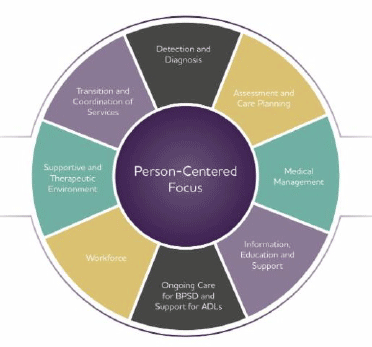
Sam Fazio

Doug Pace
Sam Fazio, PhD
Director of Quality Care
Doug Pace, NHA
Director of Mission Partnerships
Since its inception, the Alzheimer’s Association has been a leader in outlining principles and practices of quality care for individuals living with dementia. Early on, the Guidelines for Dignity described goals for quality care, followed by Key Elements of Dementia Care and the Dementia Care Practice Recommendations, as more evidence became available. In its new iteration, detailed in 10 area-specific articles published in the February supplement of The Gerontologist, the Alzheimer’s Association 2018 Dementia Care Practice Recommendations outlines 56 recommendations grounded in the fundamentals of person-centered care. In addition to providing greater details about each recommendation, the articles provide evidence and expert opinion supporting each recommendation.
They were developed by 27 dementia care experts convened by the Alzheimer’s Association and are based on a comprehensive review of current evidence, best practice, and expert opinion. The recommendations seek to better define quality care across all care settings and throughout the disease course. They are intended for professional care providers who work with individuals living with dementia and their families in long-term and community-based care settings.
Person-centered care, the foundation of the recommendations, is an approach to caregiving that respects those receiving care as individuals with unique needs and preferences; attempts to promote respect, engagement, individuality, independence, and a better quality of life for those receiving and providing care; and addresses the changing needs of each person with dementia. With the fundamentals of person-centered care as the foundation, the Dementia Care Practice Recommendations illustrate the goals of quality dementia care in the following additional areas:
 Detection and diagnosis
Detection and diagnosis- Assessment and care planning
- Medical management
- Information, education, and support
- Ongoing care for behavioral and psychological symptoms of dementia and support for activities of daily living
- Workforce
- Supportive and therapeutic environments
- Transitions and coordination of services
In addition to the recommendations in areas familiar to the dementia care community, these recommendations break important new ground. Most notably, the recommendations offer guidance to community-based and residential care providers on detection and diagnosis and ongoing medical management — topic areas typically reserved for clinicians. Recommendations in the two areas are written specifically for non-physician care providers and address what they can do to help with these important aspects of holistic, person-centered dementia care.
In conjunction with the recommendations, the Alzheimer’s Association has released a separate report that examines quality care through the eyes of people living with the disease. A Guide to Quality Care from the Perspectives of People Living with Dementia includes survey data and interviews from individuals living in the early stage of Alzheimer’s or other dementias. It offers insights into how those most affected by the disease view quality care and what they want from care providers and caregivers during their difficult journey.
The Alzheimer’s Association Dementia Care Practice Recommendations provide the backbone for programs to support the dementia care field — ensuring that all who are receiving care, and all who are providing care, have the Association’s recommendations as the foundation for quality, person-centered care. The Alzheimer’s Association is hopeful that these recommendations will greatly inform and substantially influence and inform quality care, training, practice, and policy.
For more information on the recommendations and program related to them, visit alz.org/qualitycare.


